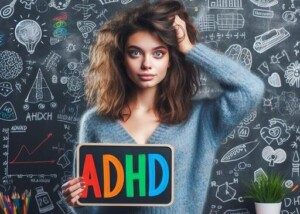Life expectancy and ADHD are actually linked — in ways stronger than you’ve ever imagined.
But does this mean ADHD is an automatic sentence to a premature death?
What is it about ADHD, which is not an outgrown condition, that can impact lifespan?
A groundbreaking study by researchers from University College London has uncovered that adults diagnosed with attention deficit hyperactivity disorder may have a shorter life expectancy compared to those without it.
Published in The British Journal of Psychiatry, the research analyzed anonymous primary care data from over 30,000 adults in the UK who had ADHD and compared them to more than 300,000 adults without the disorder.
Study Results
- Men with ADHD had a life expectancy that was reduced by between 4.5 and nine years.
- Women with ADHD faced a reduction of between 6.5 and 11 years.
The researchers believe this shorter life expectancy could be linked to the difficulties that adults with ADHD often face.
These include a lack of support, stressful life events and social exclusion, which can negatively affect both their physical and mental health.
Another consideration that certainly can’t be overlooked is the possibility that some of the adults, especially women, may also be autistic, or, be autistic instead of having ADHD.
Autism spectrum disorder is sometimes misdiagnosed as ADHD due to overlapping features such as stimming/fidgeting, easy distractibility and difficulty with social interactions.
A study published in The Journal of Child Psychology and Psychiatry found that many Autistics were initially diagnosed with ADHD (Lecavalier, 2017).
Nevertheless, the UCL study’s results can’t be ignored, since many with ADHD don’t have autism.
The paper explains that many ADHD’ers do not receive the necessary support to manage their condition.
Without appropriate treatment ADHD can lead to problems in several areas of life, including education, work and personal relationships.
The study authors note that the reduction in life expectancy is likely a result of challenges related to untreated ADHD, rather than the disorder itself.
The research also points out an alarming statistic: Fewer than one in nine adults with ADHD in the UK have been formally diagnosed.
What is ADHD?
ADHD is a neurodevelopmental condition that begins in childhood and cannot be “cured.”
ADHD’ers tend to experience difficulties in regulating their attention, leading to issues with focusing on mundane tasks, and also impulsiveness and restlessness.
ADHD also comes with strengths: hyperfocus, flexibility to new experiences, and high energy.
However, the troublesome traits can make managing daily responsibilities more difficult.
Unfortunately, the struggles faced by adults with ADHD can lead to long-term consequences if left untreated, including mental health issues, substance abuse and other health problems that would heighten the risk of a shortened lifespan.
If you have ADHD are you doomed to a short life?

©Lorra Garrick
The study authors note that the findings may not fully reflect the overall population of adults with ADHD, as the sample only included those who had been formally diagnosed.
This means that adults who may have ADHD but have not sought diagnosis or treatment were not included, possibly skewing the results toward individuals with more severe cases of the condition.
In other words, someone with “mild ADHD” may not experience the struggles that would raise the risk of dying younger.
Furthermore, the study did not have access to detailed data on the causes of death; it couldn’t definitively determine which factors contributed to the reduced life expectancy.
Another glaring consideration – not covered by the UCL research – is that the symptoms of ADHD markedly overlap with those of untreated sleep apnea.
So if someone with untreated, undiagnosed obstructive sleep apnea is told they have ADHD, then this spells big trouble.
Untreated OSA can lead to high blood pressure that doesn’t respond well to medication or an improved diet.
Untreated OSA can also lead to chronic heart failure.
The symptoms of OSA and ADHD overlap so much (even in thinner people, women and children), that Frank Barnhill, MD, strongly urges that anyone with an ADHD diagnosis be tested for OSA.
This doesn’t mean one can’t have both ADHD and OSA. However, it’s possible to have only OSA – cleverly masquerading as ADHD!
UCL Study’s Take on Lack of ADHD Support
Dr. Liz O’Nions, lead author of the study, says in the paper that many with ADHD do, indeed, live a long life.
But also, on average, they’re living shorter lives due to unmet support needs.
The specific causes of the premature mortality need to be found.
Keep in mind that ADHD is under-treated in the UK when compared to other industrialized countries.
For those who speculate that ADHD is over-diagnosed in the United States, you may want to consider that this – to some degree – is related to the fact that obstructive sleep apnea is one of the most under-diagnosed and misdiagnosed conditions in the States! A possible connection here is a very intriguing conjecture.
A study published in the Journal of the American Medical Association found that about 80% of people with moderate to severe OSA are undiagnosed. (Note: Not all people with OSA snore.)
Lack of awareness and limited screening contribute to the high rates of misdiagnosis and under-diagnosis (Young et al., 2008).
Solutions: Live a Longer Life with ADHD
The lifestyle habits that promote a healthier, longer life for the general population would also apply to ADHD’ers.
Don’t Smoke. If You Do, Quit.

Shutterstock/Bogdan Vija
Limit Liquor. Replace Alcohol with a Hot Bath, Aromatherapy, Playing with Your Dog, a Brisk Walk, Yoga.

Freepik.com
Manage Your Weight. Lose Weight if Obese.

Eat More Healthfully. Limit Ultra-Processed Foods.

Exercise. Do Both Aerobics and Strength Training.

Freepik.com
Get Annual Health Checkups.

 Lorra Garrick has been covering medical and fitness topics for many years, having written thousands of articles for print magazines and websites, including as a ghostwriter. She’s also a former ACE-certified personal trainer. In 2022 she received a diagnosis of Level 1 Autism Spectrum Disorder and subsequently has developed an intense interest in ASD.
Lorra Garrick has been covering medical and fitness topics for many years, having written thousands of articles for print magazines and websites, including as a ghostwriter. She’s also a former ACE-certified personal trainer. In 2022 she received a diagnosis of Level 1 Autism Spectrum Disorder and subsequently has developed an intense interest in ASD.
.










































